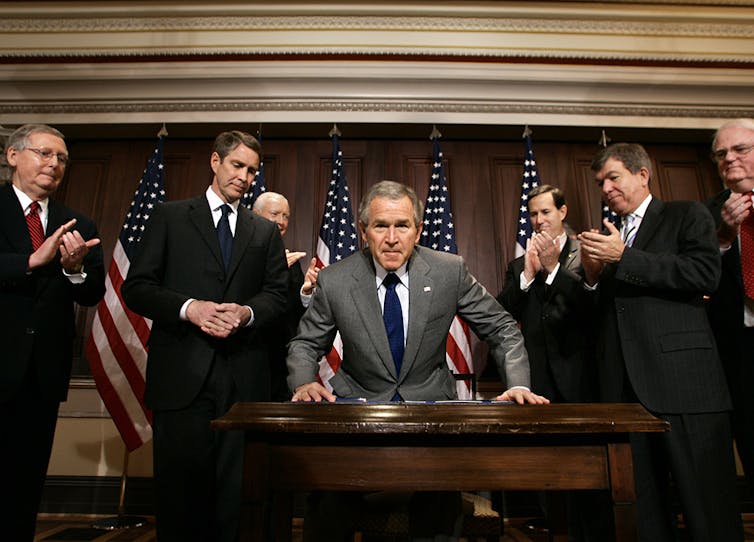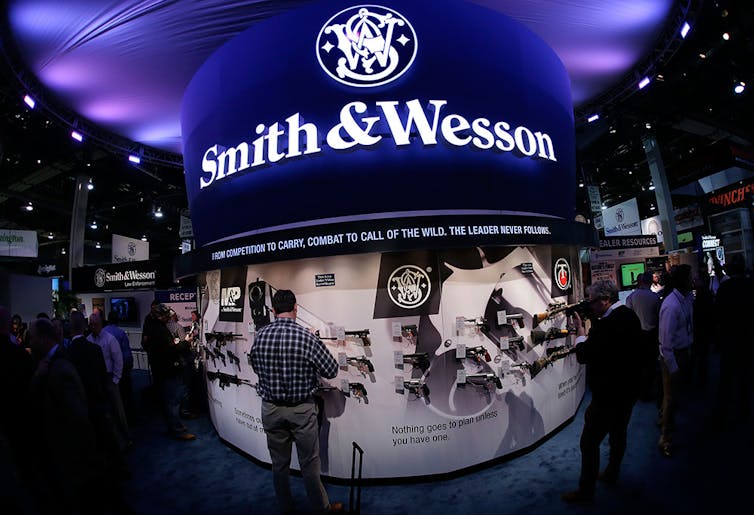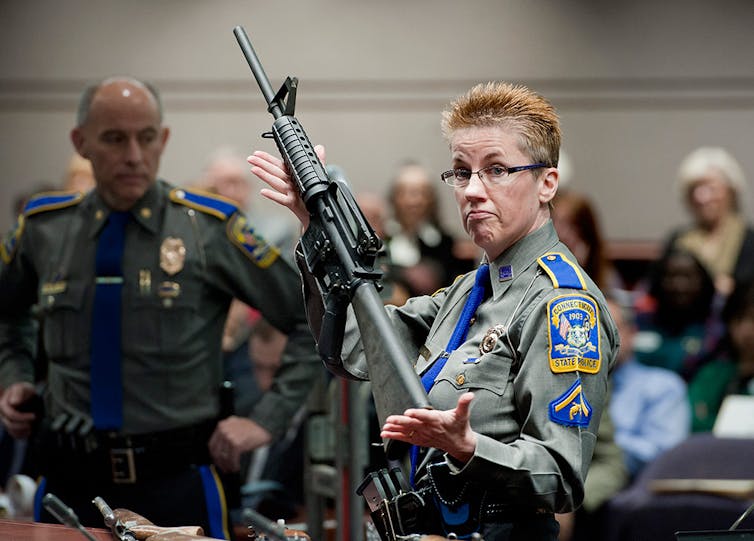Why do gun-makers get special economic protection?
- Written by Allen Rostron, Associate Dean for Students and William R. Jacques Constitutional Law Scholar and Professor of Law, University of Missouri-Kansas City
The gun industry is one of very few industries[1] to have congressionally backed immunity from liabilty[2].
As a result, it’s been largely shielded from responsibility for the deaths and injuries its products cause, with few exceptions.
How did this happen? And, in the aftermath of another tragic mass shooting, could this protection ever be overturned?
As an expert in constitutional law and product liability, I believe the answer to these questions lies in examining the economic and political clout of the gun industry.
Gun industry gets a protector
The gun industry[3] acquired its protective shield[4] in 2005 after a wave of lawsuits[5] by cities threatened gun companies’ survival.
New Orleans became the first government[6] to file a lawsuit against gun manufacturers in 1998. More than 30 other American cities and counties soon followed.
The suits, prompted by the growing epidemic of urban gun violence and patterned after claims brought by states against tobacco companies, initially succeeded by shining a spotlight on the industry. I was one of the lawyers at the Brady Center to Prevent Gun Violence who helped put these cases together. They uncovered evidence[7] about how gun manufacturers could reduce risks by making changes in the way they design and distribute their products.
But then came the Protection of Lawful Commerce in Arms Act[8], which gave gun-makers a special immunity from legal responsibilities and blocked most of the claims. While Congress has occasionally limited the liability of companies making other products, such as medical devices and small aircraft[9], the degree of protection given to the gun industry was unusual and didn’t create alternative ways to regulate the industry and compensate those injured, as it did with the makers of childhood vaccines[10].
 President Bush sits down to sign the Protection of Lawful Commerce in Arms Act, which shielded the firearms industry from civil lawsuits brought by victims of gun crimes.
AP Photo/J. Scott Applewhite
President Bush sits down to sign the Protection of Lawful Commerce in Arms Act, which shielded the firearms industry from civil lawsuits brought by victims of gun crimes.
AP Photo/J. Scott Applewhite
Good times for gun-makers
Now a string of recent mass shootings, from Orlando[11] to Las Vegas[12] to Parkland[13], has brought renewed scrutiny to the gun industry’s products and practices.
It comes at a time when the firearms industry has enjoyed remarkable growth. In an unintended and sadly ironic way, the mass shootings actually contribute to the industry’s financial success.
Gun sales are strongly correlated to prospects for gun control and surge whenever it seems more likely that new legal restrictions on guns may be imposed. And this was the case in 2008, when the election of Barack Obama rejuvenated the then-stagnant industry. Fearful that President Obama would take away their guns, many Americans rushed to stock up[14] on new weaponry. Production[15] of firearms rose steadily throughout Obama’s first term, even though he did virtually nothing[16] at that time to advance a gun control agenda.
The massacre at Sandy Hook Elementary School[17] shortly after Obama won re-election in 2012 drove gun sales to unprecedented levels, with production reaching an all-time high of nearly 11 million[18] in 2013 – yielding more economic clout than ever before.
The industry’s economic impact rose[19] from $19 billion in 2008 to over $51 billion in 2016, according to the National Shooting Sports Foundation, the firearms industry’s trade association. And its impact is felt across the country in both red and blue states and politically important ones, from Texas and California to Florida and Ohio. Some of the nation’s oldest and largest gun companies are still based in the legendary “Gun Valley”[20] region of New England, but there are other manufacturers scattered around the nation. Wholesale distributors and retail dealers operate virtually everywhere.
The number of jobs[21] supported by the industry nearly doubled to about 301,000 in that period, with the largest totals in Texas and California. The taxes paid by the industry have increased even more dramatically.
The gun lobby’s power
Gun companies have made it clear they are willing to relocate their operations if the price is right, and state and local governments have thrown millions of dollars[22] in subsidies and tax breaks at them in recent years. For example, Remington Arms shifted much of its manufacturing from New York to Alabama a few years ago, drawn by $68.9 million[23] in government handouts, as well as displeasure with New York’s enactment of tougher gun laws.
And the industry has used this growth in wealth, employment and taxes to exercise its political muscles at the state and national levels. The trade association’s annual lobbying expenditures[24], negligible prior to Obama’s election, soared after Sandy Hook to more than $3.3 million in 2017.
Its biggest political influence comes through its customers, who are a uniquely potent force[25]. The National Rifle Association spends over 50 percent more[26] on lobbying than the gun industry and nearly 10 times[27] as much as any gun control group.
And while the industry’s interests are usually aligned with those of the NRA, even when a gun-maker wants to take a softer position on gun policy it’s extremely risky to do so. A case in point came in 2000, when Smith & Wesson tried to ease the burden of the lawsuits against it by agreeing to be more careful in how it designed and distributed its products as part of a settlement agreement[28]. Its modest steps prompted boycotts[29] by gun owners that nearly destroyed the company in a few short months.
 Smith & Wesson nearly went bankrupt after modest steps to make its guns safer sparked a backlash.
AP Photo/Julie Jacobson
Smith & Wesson nearly went bankrupt after modest steps to make its guns safer sparked a backlash.
AP Photo/Julie Jacobson
Turning the tables
The question now is, can the increasing frequency of tragedies like Parkland and the resulting raw youth outrage turn the tables on the gun industry?
Applying financial pressure is one way to get the industry’s attention. Several years ago, a coalition of organizations began a divestment campaign[30], encouraging people to move their savings out of mutual funds that invest in gun companies. Fund managers say the campaign is having its intended effect, with more investors[31] demanding that funds dump gun stocks. According to one study, the amount of assets precluded from being invested in companies that make weaponry for military or civilian use has increased [1,042 percent] since Sandy Hook. This campaign is cited as a factor[32] that led to the bankruptcy of Remington, the maker of the AR-15 rifle used in that shooting.
The idea has recently gained new momentum[33]. Legislators in New Jersey[34] and teachers in Florida[35] are now calling for public employee pension funds to sell their shares of firearms companies. Other socially conscious investors are keeping their shares and using them as a channel to express concern. Shareholders of companies that make or sell firearms, like Sturm Ruger & Co. and Dick’s Sporting Goods, have called[36] for gun-makers to explain what they are doing to reduce the risks posed by their products.
Americans fed up with the NRA’s intransigence[37] have also begun putting pressure on a wide range of businesses[38] to cut ties with the gun rights group.
 A Connecticut State Police detective holds up a Bushmaster AR-15 rifle, the same make and model of gun used by Adam Lanza in the Sandy Hook school shooting.
AP Photo/Jessica Hill
A Connecticut State Police detective holds up a Bushmaster AR-15 rifle, the same make and model of gun used by Adam Lanza in the Sandy Hook school shooting.
AP Photo/Jessica Hill
What the future holds
Preventing some NRA members from getting a discount[39] on a car rental or airline flight is obviously not going to bring the gun lobby to its knees or lead to a repeal of the industry’s immunity. But every small step brings attention to the issue and builds the pressure that will eventually change the political calculus for legislators.
A large majority[40] of Americans support the enactment of stricter gun laws, but the crucial question will be whether the intensity of their feelings about the issue ever match the passion of those who fiercely favor gun rights.
Change will happen if enough people make it clear that their preference for stronger regulation of firearms is something that affects how they spend their money and how they cast their votes.
References
- ^ one of very few industries (www.politifact.com)
- ^ immunity from liabilty (theconversation.com)
- ^ gun industry (theconversation.com)
- ^ acquired its protective shield (www.govtrack.us)
- ^ wave of lawsuits (www.bradycampaign.org)
- ^ New Orleans became the first government (theconversation.com)
- ^ evidence (www.bradycampaign.org)
- ^ Protection of Lawful Commerce in Arms Act (www.congress.gov)
- ^ such as medical devices and small aircraft (www.politifact.com)
- ^ it did with the makers of childhood vaccines (www.fda.gov)
- ^ Orlando (www.cnn.com)
- ^ Las Vegas (www.washingtonpost.com)
- ^ Parkland (www.nbcnews.com)
- ^ stock up (www.washingtonpost.com)
- ^ Production (www.atf.gov)
- ^ virtually nothing (www.atf.gov)
- ^ Sandy Hook Elementary School (www.cnn.com)
- ^ 11 million (www.atf.gov)
- ^ industry’s economic impact rose (d3aya7xwz8momx.cloudfront.net)
- ^ “Gun Valley” (www.bostonglobe.com)
- ^ number of jobs (d3aya7xwz8momx.cloudfront.net)
- ^ millions of dollars (www.motherjones.com)
- ^ $68.9 million (www.al.com)
- ^ annual lobbying expenditures (www.opensecrets.org)
- ^ uniquely potent force (theconversation.com)
- ^ spends over 50 percent more (www.opensecrets.org)
- ^ nearly 10 times (www.businessinsider.com)
- ^ settlement agreement (clintonwhitehouse4.archives.gov)
- ^ boycotts (www.washingtonpost.com)
- ^ divestment campaign (www.adweek.com)
- ^ more investors (www.vox.com)
- ^ cited as a factor (www.sacbee.com)
- ^ new momentum (www.vox.com)
- ^ Legislators in New Jersey (www.reuters.com)
- ^ teachers in Florida (www.bloomberg.com)
- ^ called (www.bloomberg.com)
- ^ fed up with the NRA’s intransigence (theconversation.com)
- ^ wide range of businesses (www.newsweek.com)
- ^ getting a discount (onemileatatime.boardingarea.com)
- ^ large majority (www.pollingreport.com)
Authors: Allen Rostron, Associate Dean for Students and William R. Jacques Constitutional Law Scholar and Professor of Law, University of Missouri-Kansas City
Read more http://theconversation.com/why-do-gun-makers-get-special-economic-protection-93241

